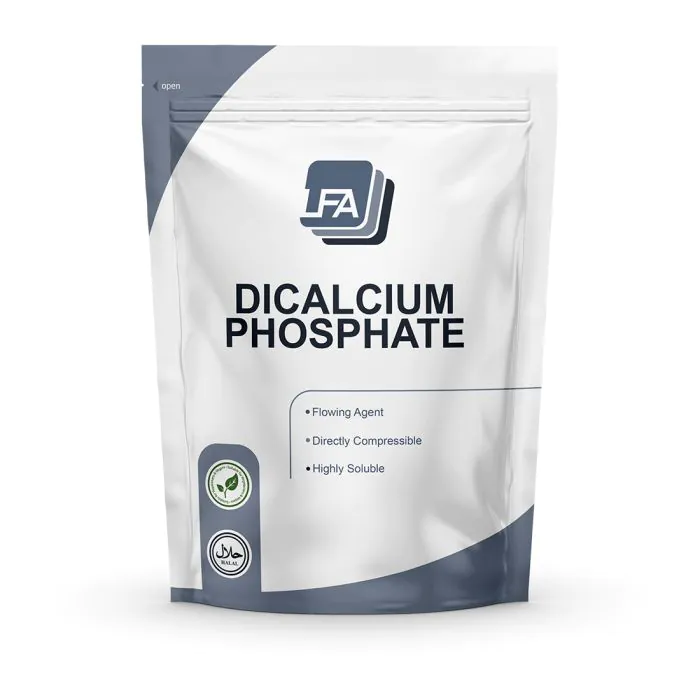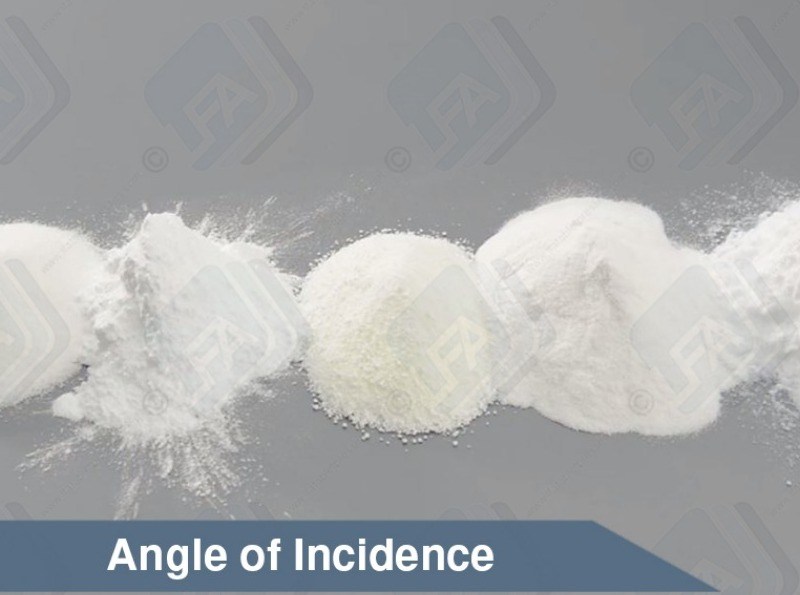Di-fosfato é um ingrediente em uma gama de produtos diferentes. É usado na produção de comprimidos e cápsulas como agente de"fluxo". Fosfato dicálcico vem em tamanhos diferentes de malha. As notas mais grosseiras fornecidas aqui fluem bem e tem excelente capacidade de compactação.
Fluidez é um elemento crucial do processo de fabricação. Ele garante que seus ingredientes serão executado através de máquinas com facilidade. Além disso, significa que seus produtos finais terá ingredientes consistentes ao longo. Isso garante que cada comprimido será o mesmo.
Compressibilidade é a facilidade em que um pó constitui para um sólido comprimido. Fosfato do LFA é diretamente compressível. Utilizando excipientes como fosfato dicálcico reduz o esforço necessário para criar novas fórmulas.
Fosfato é altamente solúvel em ácido cítrico e citrato de amónio. Tem um ph de 6.5 a 7. Devido a alcalinidade não funciona com alguns ingredientes ativos ácidos. Propriedades de vinculação de fosfato dicálcico só são moderadas. Terá de ser desde o começo do lado outros excipientes.
Fosfato dicálcico passará facilmente através do sistema digestivo. Tem muitos usos diferentes e é um suplemento alimentar por conta própria. Isso é muitas vezes incluído em cereais de pequeno-almoço, produtos de farinha e macarrão. É usada como um agente antiaglomerante que pode absorver pequenas quantidades de umidade. É também um mineral fontes de fósforo que é frequentemente usado em dietas orgânicas. Outro uso proeminente para fosfato dicálcico é na alimentação animal. Contribui para o metabolismo do animal e acelera o crescimento e desenvolvimento.
Manipulação de Di-cálcio fosfato corretamente é importante para a segurança e a qualidade do produto. Este produto pode irritar os olhos e com a inalação pode causar desconforto no peito suave. Quando o tratamento, você deve usar equipamento protetor de olhos, luvas e uma máscara de inalação. Guarde sempre o fosfato dicálcico num recipiente selado com temperaturas moderadas. Evite a exposição à umidade e temperaturas extremas. Armazenamento incorreto pode afetar a dureza do tablet ao longo do tempo.
Fosfato dicálcico é um agente efetivo de fluxo que contribuirá nutrientes de sua fórmula. Ele pode ser adicionado a muitos alimentos como um suplemento para contribuir para ambos um seres humanos e animais bem-estar. Fósforo e cálcio a uma dieta de consumidores irão melhorar as funções corporais em muitas maneiras. Este é um produto que os consumidores são familiares com e faz o complemento perfeito para o seu tablet.
Fosfato do LFA
chega como um pó cristalino. Vai ser branco ou quase branco, inodoro e free-flowing.
Escreva sua Própria Avaliação
Are all excipients safe for all ages to consume?
Yes, it does not matter what age, size or sex the person consuming the products is. It is, however, important to check the intolerance data.
Are all the excipients safe for human consumption?
Yes, all of the excipients are safe for human or animal consumption. There are some precautions that should be taken when handling them and there are some people that might have intolerances to some of them. Information on this can be found in the products MSDS and Intolerance Data Sheet. This can be found in this section for every excipient.
Are there any known allergens or health risks?
São seus Excipientes natural?
Sim, todos os nossos Excipientes são extraídos de fontes naturais. Para mais informações, por favor visite as páginas de produto individuais.
Can I get a better price for excipients than is listed on the website?
Yes, we have bulk pricing for all of our excipients, and these can be found in this section. We offer bulk in 500 kg, 1 ton, 2 ton and 5 ton lots. The prices are set on these quantities as these are the amounts that will fit on pallets.
Can I have a CoA for my Excipient?
Yes. CoA stands for Certificate of Analysis this is also known some times as an MSDS (Material Safety Data Sheet) all of the information contained in a CoA is inside the MSDS for every LFA product which is emailed to you after purchase.
Posso produzir tablets sem Excipientes?
É improvável que você será capaz de produzir tablets sem a utilização de qualquer dos Excipientes. Certos produtos ligação sem Excipientes, mas não o fluxo através da máquina. Nós aconselhamos que você use um
Dissolving rate? Any known factors that can affect the rate, speed up or slow down the breakdown of a tablet?
Yes. There are two things at play here. You can get hygroscopic and hydrophobic excipients. Hygroscopic means that they take on water quickly, while hydrophobic means that they repel water.
There are products know as supper disintegrants. These products help the breakdown of tablets. At the moment LFA does not sell any supper disintegrants.
Magnesium stearate is hydrophobic this means that it will slow the breakdown of a tablet.
However, it is used in such small amounts that most of the time it will not make a difference to our customer's products. If they would like to be sure then they should conduct what is known as a disintegration test.
Do any of the excipients increase the speed of damage to tooling? i.e. more granular?
Yes, Dicalcium Phosphate, if used in high amounts, will cause more damage to tooling than just Firmapress or MCC. However, there are not many situations in which this would be a good idea.
How long is the storage period of each excipient? What is the shelf life?
Firmapress - 2 years form batch date.
Dextrose - 3 years from batch date.
Dicalcium Phosphate - 3 years from batch date.
Microcrystalline Cellulose -
Magnesium stearate -
Lactose - 2 years from batch date.
Silica Dioxide - 2 years from batch date.
How should I clean contact parts that have come into contact with my excipients or active ingredients?
here are 6 steps that should be followed as a general rule of thumb when cleaning contact surfaces that have come into contact with powders:
Dry Clean - First you need to remove as much of the dry powder as possible. You can do this using a hover/vacuum. Make sure that the vacuum you are using has a filter good enough to handle fine dust.
Wet Clean - Next you need to perform a wet clean. This can be done with warm water and soap or if available an ultrasonic cleaner.
Rinse - Next you need to rinse off any soap with potable water (drinking water). You do not have to do this if you used an ultrasonic cleaner in the last step. It is important to ensure that all parts are thoroughly dried immediately after washing to avoid any rusting.
Sanitise - Next you need to sanitise the surface. This step is recommended by the FDA. There are a number of sanitising solutions available designed to be applied and left on.
Lubricate - You now need to lubricate any parts that require it. This should be with the appropriate grade oil or grease considering your use and greasing chart. Store - Finally store any of the parts in a cool dry place. If you are storing them on the machine then make sure the machine is in a temperature controlled environment with low humidity.
Qual é a diferença entre o intervalo de excipientes?
Oferecemos a Celulose Microcristalina, Estearato de Magnésio, Fosfato Bicálcico e Firmapress na nossa gama de excipientes.
A Celulose microcristalina é um agente de ligação, que contém o conteúdo do tablet juntos.
Fosfato bicálcico é um fluxo de agente e ajuda a mover os ingredientes através do aparelho, antes de serem comprimidos.
Estearato de magnésio é um lubrificante seco e ajuda-o novamente com o movimento de ingredientes através da máquina, mas também ajuda com a expulsão dos comprimidos da máquina. Por favor, note que o Magnésio Sterate não vincular por si mesma.
Firmapress é um tudo em um mix de Celulose Microcristalina, Estearato de Magnésio e Fosfato Bicálcico.
What is the mesh size of your excipients? etc.
Dextrose - approx 100 mesh
Dicalcium Phosphate - approx 100 mesh
Microcrystoline Cellulose - approx 120-200
Magnesium sterate -
Lactose - 80 mesh
Silica Dioxide -
Firmapress - 100-200 mesh
What kind of agent is each excipient?/ What is the main use of each excipient?
Dextrose - Sweetener, binding agent, good for chewable tablets or candy.
Microcrystalline Cellulose - Binder, filling agent. Good at binding tablets and making them bigger. It can also be used as a filler for capsules.
Magnesium stearate - Dry Lubricant. This stops products from getting stuck to the tooling. It can also help with powder flow issues and caking issues.
Lactose - Binder, sweetener and bulking agent. It has a large mesh so it flows well but most people do not like it because of the intolerance issues.
Silica Dioxide - Flowing agent. This assist powders in flowing smoothly through the machines. It also helps with cacking issues where powders get stuck to the machine.
What kind of condition should excipients be stored in?
Firmapress - 2 years form batch date.
Dextrose - 3 years from batch date.
Dicalcium Phosphate - 3 years from batch date.
Microcrystalline Cellulose -
Magnesium stearate -
Lactose - 2 years from batch date.
Silica Dioxide - 2 years from batch date.
Which excipient should I add if the product doesn't bind well?
If your product does not bind well then we would recommend using MCC. This can be used in any % the limiting factor is the size of the tablet.
If the amount of MCC you would have to use would be too much or if you do not want to use MCC then you have 3 other options: Ask your supplier for a directly compressible or tabletable grade of your product. Spray dry your product. Wet granulate your product.
Which excipient should I add if the product is sticky?
If your product is sticky then you will need to add a dry lubricant to your mix. For this, we recommend magnesium stearate.
We do not recommend that you add more than 1% to the mix as more than this can cause capping. If your product is still sticky at this point then we would recommend looking into granulation.
Which excipient should I add if the product/API is clumpy?
If your product or API is clumpy then you will need to add an anticaking agent. For this, we recommend silicon dioxide. We only recommend adding a maximum of 2% of this to the mix








